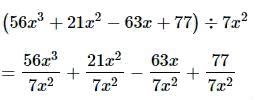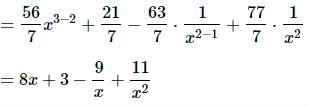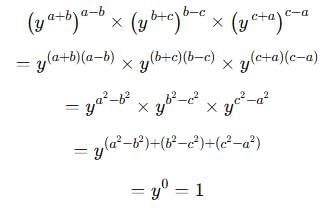Mechanical Engineering Exam > Mechanical Engineering Tests > General Aptitude for GATE > Test: Exponents- 3 - Mechanical Engineering MCQ
Test: Exponents- 3 - Mechanical Engineering MCQ
Test Description
15 Questions MCQ Test General Aptitude for GATE - Test: Exponents- 3
Test: Exponents- 3 for Mechanical Engineering 2025 is part of General Aptitude for GATE preparation. The Test: Exponents- 3 questions and answers have been
prepared according to the Mechanical Engineering exam syllabus.The Test: Exponents- 3 MCQs are made for Mechanical Engineering 2025 Exam. Find important
definitions, questions, notes, meanings, examples, exercises, MCQs and online tests for Test: Exponents- 3 below.
Solutions of Test: Exponents- 3 questions in English are available as part of our General Aptitude for GATE for Mechanical Engineering & Test: Exponents- 3 solutions in
Hindi for General Aptitude for GATE course. Download more important topics, notes, lectures and mock
test series for Mechanical Engineering Exam by signing up for free. Attempt Test: Exponents- 3 | 15 questions in 15 minutes | Mock test for Mechanical Engineering preparation | Free important questions MCQ to study General Aptitude for GATE for Mechanical Engineering Exam | Download free PDF with solutions
Detailed Solution for Test: Exponents- 3 - Question 1
Detailed Solution for Test: Exponents- 3 - Question 2
Test: Exponents- 3 - Question 3
Which of the following expressions is equivalent to this expression?

You may assume that x>0.

You may assume that x>0.
Detailed Solution for Test: Exponents- 3 - Question 3
Detailed Solution for Test: Exponents- 3 - Question 4
Detailed Solution for Test: Exponents- 3 - Question 5
Detailed Solution for Test: Exponents- 3 - Question 6
Test: Exponents- 3 - Question 7
What are the last two digits, in order, of 6789 ?
Possible Answers:
Detailed Solution for Test: Exponents- 3 - Question 7
Detailed Solution for Test: Exponents- 3 - Question 8
Detailed Solution for Test: Exponents- 3 - Question 9
Detailed Solution for Test: Exponents- 3 - Question 10
Detailed Solution for Test: Exponents- 3 - Question 11
Detailed Solution for Test: Exponents- 3 - Question 12
Detailed Solution for Test: Exponents- 3 - Question 13
Detailed Solution for Test: Exponents- 3 - Question 14
Detailed Solution for Test: Exponents- 3 - Question 15
|
206 videos|190 docs|158 tests
|
Information about Test: Exponents- 3 Page
In this test you can find the Exam questions for Test: Exponents- 3 solved & explained in the simplest way possible.
Besides giving Questions and answers for Test: Exponents- 3, EduRev gives you an ample number of Online tests for practice



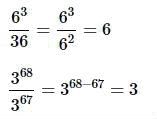





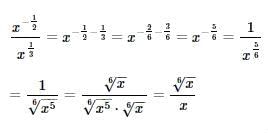

 So using this, we simplify:
So using this, we simplify: 

 So using these rules,
So using these rules,





